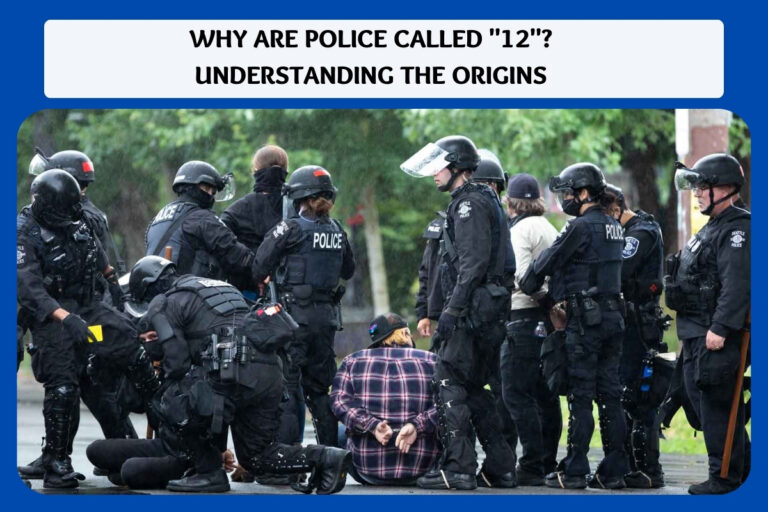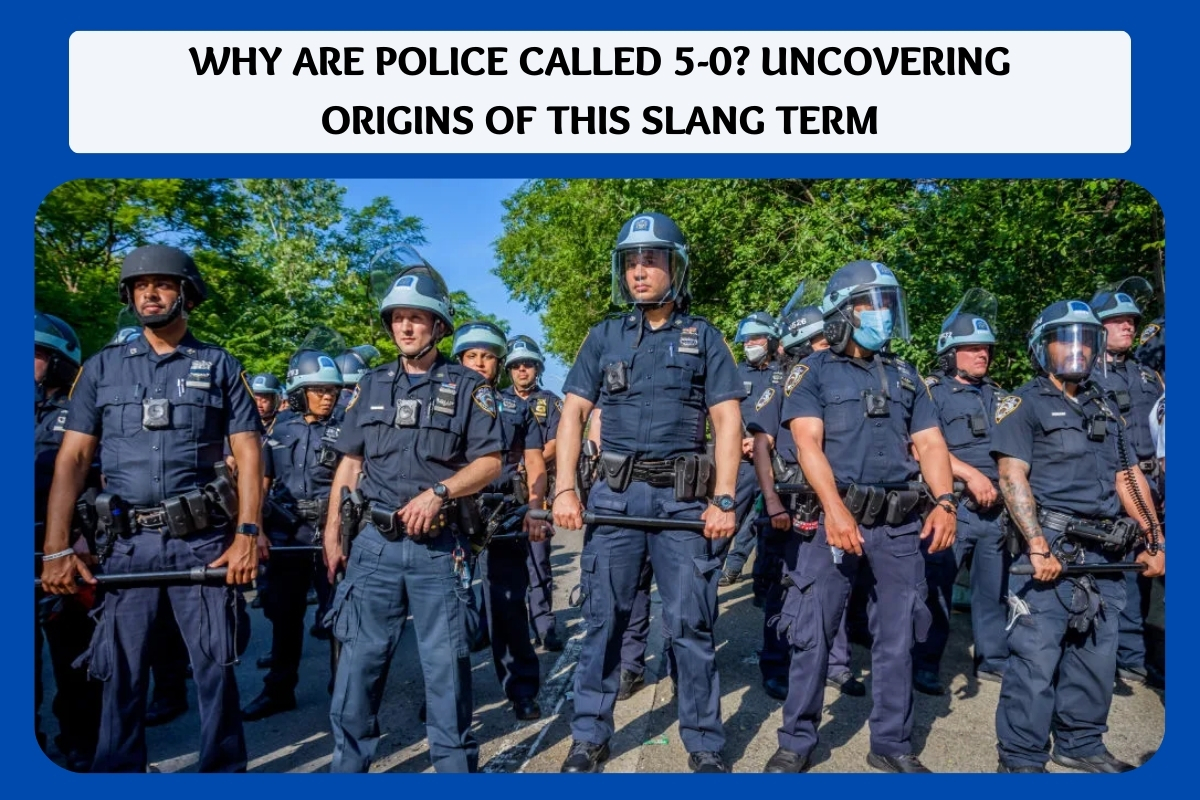Why Are The Police Called The 12? Unraveling The Mystery Behind The Term
Have you ever wondered why the police are sometimes referred to as "the 12"? This intriguing nickname has a rich history and cultural significance that dates back to specific events and societal norms. Understanding the origin of this term can provide deeper insight into how law enforcement has been perceived throughout history. In this article, we will explore the reasons behind the moniker and delve into its historical and cultural context.
The phrase "the 12" is not just a random nickname but carries a symbolic meaning tied to law enforcement practices in certain regions. It reflects the evolving relationship between the public and the police, shaped by legal frameworks, cultural narratives, and historical precedents. As we uncover the origins of this term, we will also examine how it fits into broader discussions about policing and community relations.
By the end of this article, you will have a comprehensive understanding of why the police are called "the 12," along with insights into the broader implications of such terminology. Let’s begin our journey into this fascinating topic!
Read also:Grand Rapids Boil Water Advisory A Comprehensive Guide To Staying Safe
Table of Contents
- The Historical Roots of the Term "the 12"
- Legal Context and Significance of the Number 12
- Cultural Relevance of "the 12" in Modern Society
- The Role of Law Enforcement and the Number 12
- Is "the 12" an Urban Legend?
- Statistical Insights into Policing and the Number 12
- Impact on Community Perception
- Global Perspective on Policing Terminology
- Modern Usage and Misconceptions
- Conclusion and Final Thoughts
The Historical Roots of the Term "the 12"
The term "the 12" has its roots in historical contexts that connect law enforcement with the number 12. One theory suggests that the number 12 is linked to the concept of a jury, which traditionally consists of 12 members. This connection to justice and legal proceedings may have influenced the association between law enforcement and the number 12.
Another historical perspective points to the use of the number 12 in various legal systems. For instance, in some jurisdictions, the number 12 was used to denote specific laws or ordinances related to public order and safety. Over time, this association may have evolved into a colloquial term for the police.
Origins in Colonial America
In colonial America, the number 12 was often used in legal documents and public notices. This practice may have contributed to the widespread adoption of "the 12" as a shorthand reference to law enforcement. The historical significance of the number 12 in legal and administrative contexts cannot be overlooked when examining its connection to policing.
Legal Context and Significance of the Number 12
From a legal standpoint, the number 12 holds significant importance in many judicial systems. Juries, which are a cornerstone of the justice system, typically consist of 12 members. This tradition dates back centuries and is deeply ingrained in the legal frameworks of many countries.
Beyond juries, the number 12 also appears in various legal codes and statutes. For example, some laws governing public safety and order are categorized under sections or articles numbered 12. This numerical association may have contributed to the perception of "the 12" as a symbol of authority and enforcement.
Legal Frameworks and Policing
The connection between the number 12 and law enforcement is further reinforced by legal frameworks that emphasize the role of police in maintaining public order. Statutes and regulations often reference the number 12 in contexts related to crime prevention and community safety, reinforcing its symbolic meaning.
Read also:Legal Drinking Age In Paris A Comprehensive Guide To Frances Alcohol Laws
Cultural Relevance of "the 12" in Modern Society
In modern society, the term "the 12" continues to hold cultural significance. It is often used in colloquial language to refer to law enforcement, particularly in regions where the number 12 has historical or legal relevance. This cultural relevance is reflected in media, literature, and popular culture, where the term is frequently employed to evoke a sense of authority and order.
Moreover, the cultural perception of "the 12" is influenced by societal attitudes toward law enforcement. In some communities, the term may carry positive connotations, symbolizing protection and justice. In others, it may be viewed with skepticism or even resistance, depending on historical and contemporary experiences with policing.
Representation in Media
Media plays a crucial role in shaping public perception of "the 12." Movies, television shows, and literature often depict law enforcement through the lens of the number 12, reinforcing its cultural significance. These portrayals can influence how individuals interpret and interact with law enforcement in their daily lives.
The Role of Law Enforcement and the Number 12
Law enforcement agencies around the world have embraced the symbolic meaning of the number 12 in various ways. From uniform designations to operational protocols, the number 12 is frequently incorporated into policing practices. This integration serves to reinforce the connection between law enforcement and the concept of justice.
In addition to symbolic uses, the number 12 also plays a practical role in law enforcement operations. For example, many police departments use the number 12 to categorize specific types of crimes or incidents. This numerical system helps streamline communication and improve response times, enhancing overall efficiency.
Operational Significance
From a practical standpoint, the number 12 is integral to many aspects of law enforcement. Whether used in radio codes, incident reports, or administrative processes, the number 12 facilitates effective communication and coordination among police officers. This operational significance underscores its importance in modern policing.
Is "the 12" an Urban Legend?
Despite its widespread usage, some skeptics question whether "the 12" is a genuine term or merely an urban legend. While the origins of the term are well-documented in historical and legal contexts, its cultural relevance has led to some misconceptions. Understanding the distinction between fact and fiction is essential when examining the role of "the 12" in modern society.
Research and expert analysis support the legitimacy of "the 12" as a recognized term in law enforcement. However, it is important to approach such terminology with a critical eye, considering both historical evidence and contemporary usage.
Fact vs. Fiction
Separating fact from fiction requires a thorough examination of historical records and expert opinions. By consulting reliable sources, we can gain a clearer understanding of the true significance of "the 12" in law enforcement and its cultural implications.
Statistical Insights into Policing and the Number 12
Data and statistics provide valuable insights into the role of "the 12" in modern policing. Studies conducted by law enforcement agencies and academic institutions highlight the prevalence of the term in various contexts. For example, surveys indicate that a significant percentage of the population recognizes "the 12" as a reference to law enforcement.
Additionally, statistical analysis reveals patterns in how the term is used across different regions and demographics. These findings underscore the cultural and societal factors that contribute to its continued relevance.
Key Findings
- A significant portion of the population associates "the 12" with law enforcement.
- Regional variations exist in the usage and perception of the term.
- Younger generations are more likely to use colloquial terms like "the 12" in everyday conversation.
Impact on Community Perception
The term "the 12" has a profound impact on how communities perceive law enforcement. Depending on historical and cultural factors, this perception can vary widely. In some areas, "the 12" is seen as a symbol of protection and justice, while in others, it may evoke feelings of distrust or resentment.
Community engagement initiatives by law enforcement agencies aim to address these perceptions and foster positive relationships. By promoting transparency and accountability, police departments can work to improve public trust and understanding of their role in maintaining safety and order.
Building Trust
Trust-building efforts by law enforcement include community outreach programs, public forums, and collaborative initiatives. These efforts aim to bridge the gap between police and the communities they serve, fostering mutual respect and understanding.
Global Perspective on Policing Terminology
While "the 12" is primarily associated with law enforcement in certain regions, similar terms exist in other parts of the world. These terms often reflect local cultural and historical contexts, highlighting the diversity of policing terminology across different societies.
Comparing global perspectives on policing terminology provides valuable insights into how different cultures approach law enforcement. By examining these differences, we can gain a broader understanding of the universal and unique aspects of policing practices worldwide.
Cultural Differences
Cultural differences in policing terminology are evident in the diverse ways societies refer to law enforcement. While "the 12" may be a common term in some regions, other cultures use entirely different expressions to describe police officers and their role in society.
Modern Usage and Misconceptions
In contemporary society, the term "the 12" continues to be used in various contexts, both formal and informal. However, misconceptions about its meaning and origins persist. Addressing these misconceptions requires a comprehensive understanding of the historical and cultural factors that have shaped the term.
Modern usage of "the 12" reflects the evolving relationship between law enforcement and the communities they serve. As societal attitudes toward policing continue to shift, so too does the perception and interpretation of this term.
Addressing Misconceptions
To address misconceptions about "the 12," it is essential to engage in open and honest dialogue about its origins and significance. By promoting accurate information and encouraging critical thinking, we can foster a more informed and nuanced understanding of this important term.
Conclusion and Final Thoughts
In conclusion, the term "the 12" has a rich and complex history that reflects the evolving relationship between law enforcement and society. From its historical roots in legal and judicial systems to its modern usage in cultural and societal contexts, the term continues to play a significant role in how we perceive and interact with law enforcement.
We invite you to share your thoughts and experiences in the comments section below. Your feedback is invaluable in helping us understand the broader implications of policing terminology. Additionally, feel free to explore other articles on our site for more insights into related topics.


